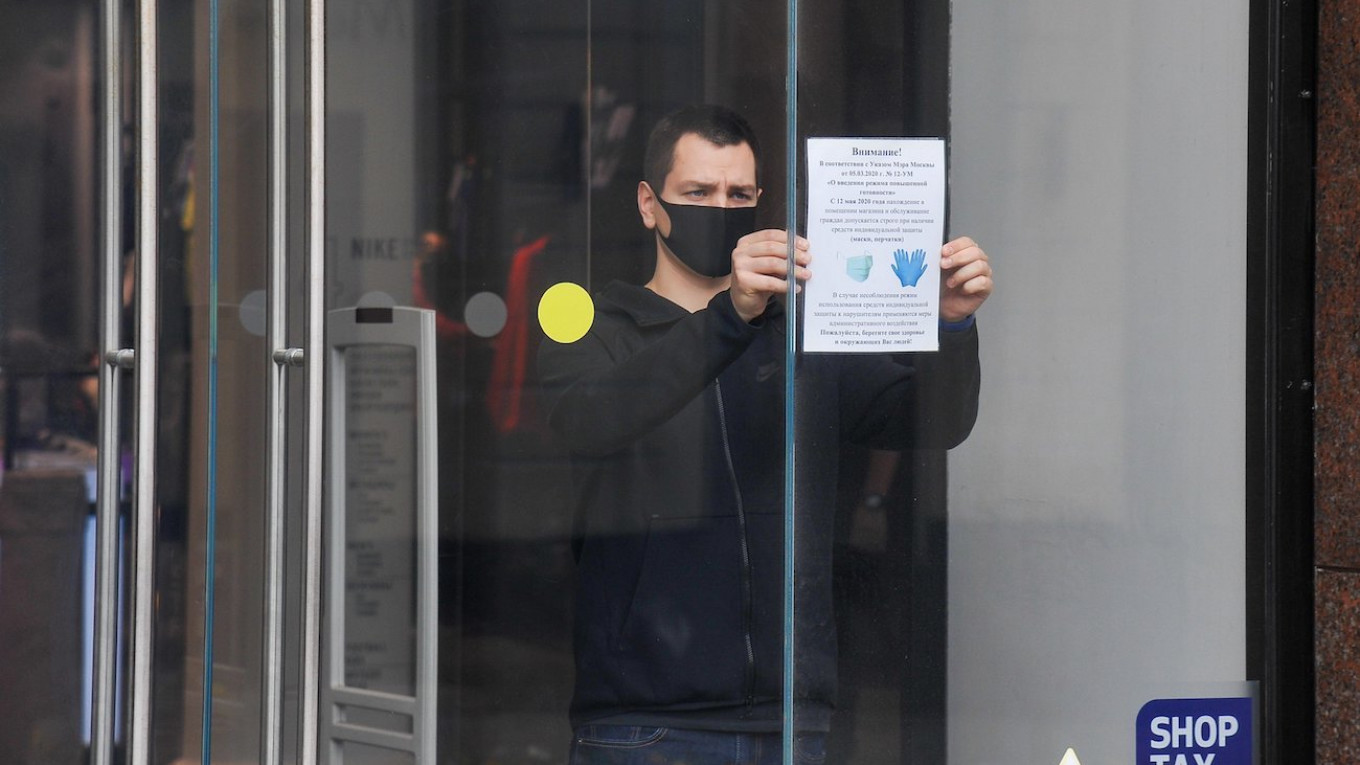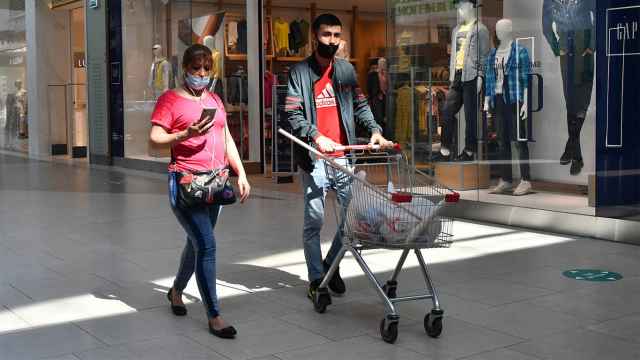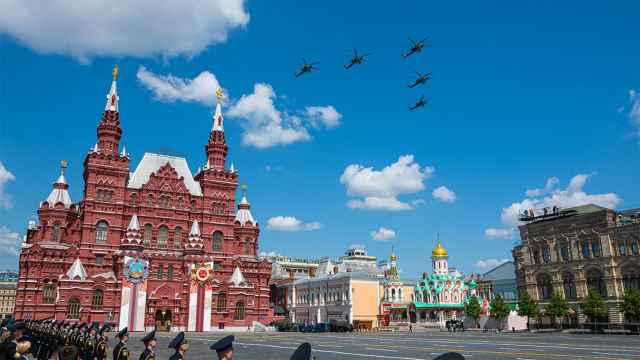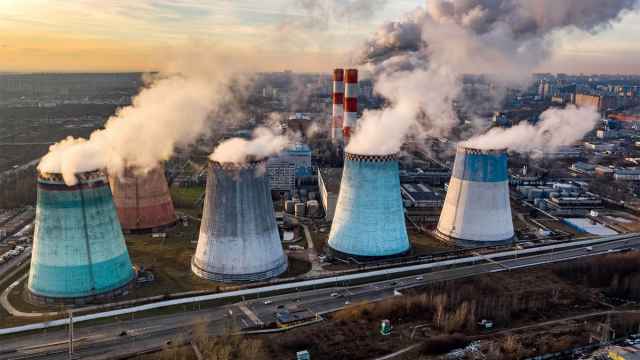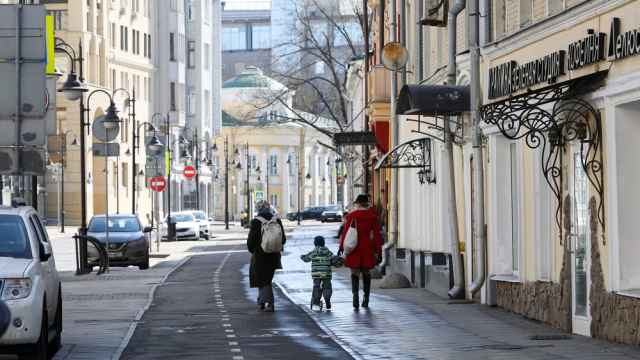Russia’s economy should be able to weather the ravages of a second wave of the coronavirus better than the first, economists say, but uncertainty and volatility will remain for the foreseeable future.
As Russia records a sharp spike in new infections and Moscow starts to roll out new restrictions — advising businesses to close their offices again and introducing extended school holidays — the economy has already started to slow down, and fears are growing among businesses of a second, potentially devastating, protracted shutdown.
However, authorities insist a tough quarantine is not on the cards, and economists are also not expecting Russia to issue wide stay-at-home orders or shutter shops, factories, construction sites and restaurants.
“There is broad perception that lockdown downsides outweigh the upsides, hence we believe that a recurrence is unlikely,” said Sofya Donets, an economist at Renaissance Capital.
Since stricter mobility restrictions mean a deeper economic hit, the measures Russia chooses to roll out to contain the spread of the virus are the main factor that will affect the economic trajectory over the next few months.
“The restrictions are unlikely to be as severe as in the spring,” Dmitry Babin, market analyst at BCS Broker told The Moscow Times, adding that “the impact on the economy will not be as strong as during the first wave.”
Analysts expect Russia to follow a so-called “Swedish model” as it deals with the second wave — imposing social restrictions on mass gatherings alongside warnings from politicians to observe social distancing and mask requirements or face tougher restrictions.
That could avoid the need for mass shutdowns, although commentators routinely point to a high degree of distrust and disregard in society for official diktats, meaning a more widespread lockdown could yet be an option.
From an economic perspective, Russia dealt with the first wave of the crisis better than some analysts expected. Despite a crash in oil prices and a new OPEC+ deal which drastically cut oil production — Russia’s main money-spinner — along with a nationwide quarantine that was one of the strictest on paper anywhere in the world, the economy only fell 8.5% in the second quarter.
Before fears of a second wave intensified, economists were predicting a 4% contraction for 2020 — much better than most advanced economies and many emerging markets. Inflation has stayed below the Central Bank’s 4% target even as it has slashed interest rates to their lowest ever level. Unemployment has increased, but only by around two percentage points.
At the same time, the government has held on to what Fitch Ratings’ Erich Arispe describes as “strong buffers” — Russia’s sovereign wealth fund was over $175 billion at last count, it has enough international reserves to cover almost two years of imports and public debt levels are extremely low at under 20% of GDP.
To spend or save?
Russian households have also accumulated an “income overhang,” Donets noted, adding that this could support spending throughout the Russian economy during the recovery. Checking accounts are up 45% and cash holdings have also grown by 27% since the pandemic started. That this money is stored in liquid easy-to-access form, rather than longer-term investments or accounts, suggests a potential willingness to spend.
Whether they do will be crucial in determining how the economy fares over the next few months, said Heli Simola, senior economist at the Bank of Finland’s Institute for Economies in Transition (BOFIT).
“Domestic consumption is the key. If there are restrictions, then that would hit the economy very hard again,” she said.
BCS Broker’s Babin fears that even a round of softer restrictions would still have a significant impact on the Russian economy due to a potentially permanent shift in consumer behavior — a mindset which could last well into the future.
“Even the removal of restrictions and the likely spread of an effective vaccine is unlikely to see the level and nature of consumption return to pre-crisis levels,” he said. “Uncertainty about future earnings and fear of a possible new pandemic will lead many to limit their spending, shifting the balance in favor of saving.”
Payments data from Sberbank shows spending on services is still down 14% compared to last year, with income at restaurants and cafes down 18% despite reopenings across the country and border closures boosting domestic tourism.
Uncertainty over spending also extends to how policymakers might respond to a second wave.
“The state has the resources, the only question is whether it wants to use them,” Natalia Volchkova, assistant professor at Moscow’s New Economic School, told Forbes.
The government proved reluctant to dip into its reserves for a stimulus package the first time round, and will need to decide what to do about measures such as cheap business loans, extra payments for families with young children, higher unemployment benefits, extra pay for medical workers and a bankruptcy moratorium that are expiring soon.
The Central Bank also faces another dilemma, according to Babin. The recent sharp fall in the value of the ruble and market volatility could lead to higher inflation and give policymakers reason to hold off from further cuts to interest rates, which have already been cut from 6.25% to 4.25% this year.
“The potential for further rate cuts is almost exhausted,” he said. “There are even risks of an increase in the event of a significant deterioration in internal and external conditions.”
Russia’s traditional reliance on oil is another vulnerability. An unprecedented agreement with OPEC+ that initially cut production by 10 million barrels a day — 10% of world output — helped stabilize the market in the spring. But given the difficulties around negotiating that deal, “it would be very difficult for the countries to make even stronger cuts,” said Simola, leaving Russia exposed to the possibility of another lurch lower in oil prices should other countries around the world impose new lockdowns, she said.
Economic scars
While the near-term outlook is fraught with uncertainty, economists are also starting to think about the more permanent effects of the virus, or so-called “economic scarring.”
“One area where we see long-term scarring is clearly in the area of human capital,” said Apurva Sanghi, lead Russia economist at the World Bank at an online conference on the Russian economy hosted by ratings agency Fitch.
A particular concern is the effect of prolonged school closures on a generation of young people, especially given that Russian students “fare poorly in collaborative problem-solving skills.” Russia reopened its schools at the beginning of September, but after a spike in cases, Moscow said it will again close them for an extended two-week midterm break.
Even with the shift to remote education, the World Bank estimates a third of the school year could have been lost — which could “reduce marginal future earnings by about 2.5% a year over a student’s working life.”
Economists also expect Russia’s pre-coronavirus battle with perennially low growth to restart as the world economy recovers from the pandemic. Indeed, many of the factors which helped save Russia from a deeper recession — a low share of small entrepreneurial businesses, domination of state-owned companies, the government’s conservative economic policy and risk aversion — will resume their usual role as drags on economic development.
Deutsche Bank found that while Russia was the third-best performer from eight major emerging market economies in terms of GDP, it will slide back to sixth place over the next 18 months.
There are other signs that the impact of the pandemic is accentuating inequality in Russia, already one of the world’s most unequal countries. An additional 1.4 million Russians have slipped into poverty — calculated by the Russian government’s definition — since the start of the pandemic, the Audit Chamber watchdog pointed out in a recent report.
Besides asking firms in the capital to send their staff back to working from home, Russia has not yet rolled out any hard additional economic restrictions. But with so many potential problems — the imposition of new lockdowns in Russia or abroad, fresh border closures or travel restrictions, prolonged ruble volatility, uncertainty over oil prices, the possibility of new government stimulus, whether the Central Bank will cut interest rates, whether consumers will prefer to spend or save — “uncertainty” is analysts’ favorite word.
“Most importantly, we don’t know if we’re in the first mile, second mile or last mile of the pandemic,” said Sanghi.
“The pandemic is in charge right now. And we’re just adapting to it.”
A Message from The Moscow Times:
Dear readers,
We are facing unprecedented challenges. Russia's Prosecutor General's Office has designated The Moscow Times as an "undesirable" organization, criminalizing our work and putting our staff at risk of prosecution. This follows our earlier unjust labeling as a "foreign agent."
These actions are direct attempts to silence independent journalism in Russia. The authorities claim our work "discredits the decisions of the Russian leadership." We see things differently: we strive to provide accurate, unbiased reporting on Russia.
We, the journalists of The Moscow Times, refuse to be silenced. But to continue our work, we need your help.
Your support, no matter how small, makes a world of difference. If you can, please support us monthly starting from just $2. It's quick to set up, and every contribution makes a significant impact.
By supporting The Moscow Times, you're defending open, independent journalism in the face of repression. Thank you for standing with us.
Remind me later.



